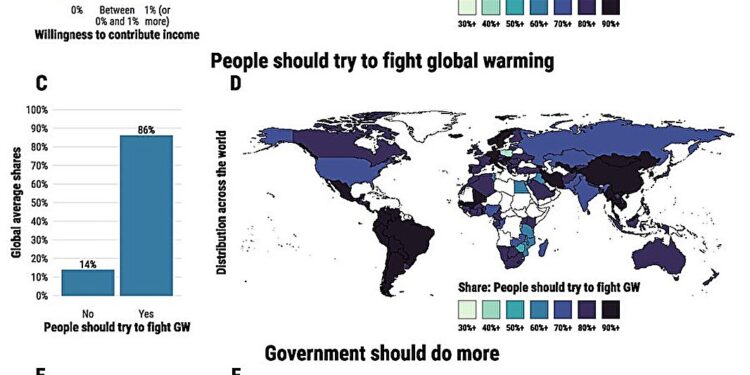Willingness to contribute 1 percent of your own income to climate protection (A, B); support for social standards for climate protection (C, D); demand for political measures (E, F). Credit: Climate change (2024). DOI: 10.1038/s41558-024-01925-3
A recent study by behavioral researchers from the University of Bonn, the Leibniz Institute for Financial Research SAFE in Frankfurt and the University of Copenhagen demonstrates for the first time that a large majority of the world’s population supports climate action and is prepared to face personal consequences. cost of fighting climate change.
The results, published in Climate change, are based on a globally representative survey conducted in 125 countries, involving approximately 130,000 people. According to the study, 69% of the world’s population is willing to dedicate 1% of their personal income to combating climate change, a significant contribution to climate action.
An overwhelming 86% approve of pro-climate social norms and 89% call for increased political action. In countries particularly affected by global warming, the desire to fight climate change is significantly higher. In countries with high GDP per capita, the will is weaker than in other countries.
“The results are extremely encouraging,” says Armin Falk, behavioral economist and economics professor, who conducted the study with colleagues from the Universities of Bonn and Copenhagen and SAFE. “The global climate is a global public good and its protection requires the cooperative effort of the world’s population. We believe that a large majority of the world’s population supports climate action.
“We also document widespread endorsement of climate-friendly social norms in almost all countries,” says SAFE economist Peter Andre. According to the survey results, 86% of respondents believe that the citizens of their country should fight against global warming. “Furthermore, there is almost universal global demand that national governments should do more to combat climate change,” adds Andre.
Willingness to contribute to climate protection based on the perceived willingness of others (A). Perception gap sorted based on actual willingness in respective countries (B). Credit: Climate change (2024). DOI: 10.1038/s41558-024-01925-3
The will to act is systematically underestimated
Despite these encouraging statistics, researchers also find that citizens’ willingness to fight climate change is systematically underestimated in every country. According to the study, the actual proportion of citizens willing to devote 1% of their income to climate action (69%) is underestimated by 26 percentage points globally.
“Systematic misconceptions about the willingness of others to act on climate change can be a barrier to success in combating climate change. People who systematically underestimate public support for climate action are often less willing to take action themselves,” says Falk.
The results suggest a potentially effective strategy to further increase individual willingness to fight climate change. “Rather than echoing the concerns of a vocal minority who oppose any form of climate action, we need to effectively communicate that the vast majority of people around the world are ready to take action on climate change and expect their national government to act,” the researchers said. to write.
“Current pessimism is discouraging and paralyzing. Our results suggest that greater optimism about climate action can trigger positive momentum,” adds Andre.
Willingness to contribute to climate protection based on GDP (A), average annual temperature (B) and the threat of global warming. Credit: Climate change (2024). DOI: 10.1038/s41558-024-01925-3
Methodology
The survey was conducted as part of the 2021/2022 Gallup World Poll. Countries included in the Global Climate Change Survey account for 96% of global greenhouse gas emissions, 96% of global GDP and 92% of the world’s population. To ensure representativeness within countries, each country sample was randomly selected from the resident population aged 15 and over. Interviews were conducted by telephone (in high-income countries) or in person (in low-income countries).
Most national samples include approximately 1,000 respondents, and the total sample includes 129,902 people. To ensure comparability across countries and cultures, the survey was professionally translated and tested extensively.
More information:
Peter Andre et al, Globally representative evidence on real and perceived support for climate action, Climate change (2024). DOI: 10.1038/s41558-024-01925-3
Provided by the University of Bonn
Quote: Global survey shows vast majority of world population supports climate action (February 13, 2024) retrieved February 13, 2024 from
This document is subject to copyright. Apart from fair use for private study or research purposes, no part may be reproduced without written permission. The content is provided for information only.



